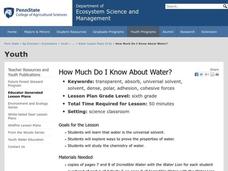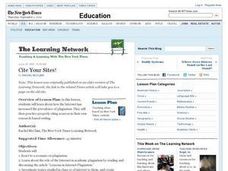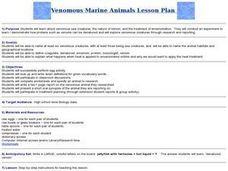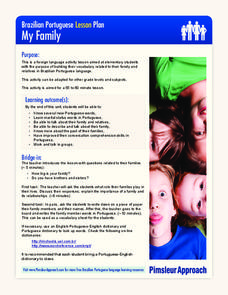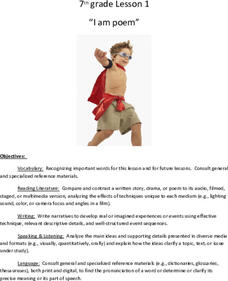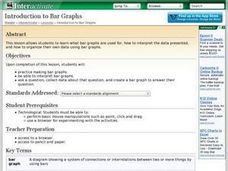Curated OER
Child Safety
Explore reading comprehension and child safety in this young adult literacy lesson. High schoolers practice using context clues to figure out word meanings after observing a teacher model this process. They read an article about child...
Curated OER
How Much Do I Know About Water?
Sixth graders explore how water behaves on a penny. In this states of matter lesson, 6th graders observe water as they add drops to a penny. This lesson helps students apply the adhesive properties of water to the water cycle.
Curated OER
How Much Do I Know About Water?
Sixth graders explore ways to analyze the properties of water and examine the chemistry of water. In this water lesson students work in groups and complete several activities.
Curated OER
Cite Your Sites
What information would you find in an almanac that you would not find in an atlas? What is the difference between a dictionary and a thesaurus? Using a Cite Your Sites worksheet on which they record their observations, groups participate...
Curated OER
Planning A Vacation Online
If you could travel anywhere in the United States, where would you go? Use this question to interest your fourth, fifth, and sixth graders as they experiment with Mapquest or other direction-based resources. They choose where they'd like...
Curated OER
Geography With Dr. Seuss
Learners read the book, The King's Stilts by Dr. Seuss and discuss the geographical information given in the book. Then they discuss and locate on a map the physical features that make up the continent of Africa. They create an original...
Curated OER
Identifying Sea Ice
Students study different types of sea ice and interview an Yupik elder or local hunter. In this sea ice lesson, students study the native language for sea ice terms. They interview an elder from Alaska's northern coast about their...
Curated OER
Identifying Implications
Students read a variety of reading passages and articles. They investigate how to make implications and assumptions using the information provided.
Curated OER
Election Vocabulary Brainstorm
Students participate in numerous activities pertaining to elections. They study election vocabulary and generate questions about campaigns and elections. They paraphrase articles and generate a class vocabulary list.
Curated OER
Save the Library!
Pupils discuss library resources and how to locate them by answering various scenarios. Role-playing as librarians, they write essays stating five reasons why the library should not be closed down.
Curated OER
Venomous Marine Animals
Students name and describe six venomous marine animals. After participating in an activity, they define new vocabulary words. In groups, they complete worksheets to use while researching a specific venomous animal of their choice. ...
Curated OER
Predicting the Meaning of Unfamiliar Words in a Text
Middle schoolers develop strategies for what to do when they come upon words in a text that they don't know. After a class discussion, pupils are given a selection of text that contains some very difficult words. They are instructed to...
Pimsleur
My Family
Ensure that your learners can describe their families using Portuguese by following the steps provided here and using the included worksheets and assessments for reinforcement. After a brief introductory activity, learners complete...
Curated OER
The Presidential Quotation Report
Famous quotations by American Presidents are the focus of this Six Trait writing activity, which could be used in a U.S. History class or in language arts. After reading the picture book Theodore by Frank Keating, have your 7th graders...
Curated OER
Shakespeare's Othello and the Power of Language
Students read and analyze Iago's rhetoric in specific monologues and dialogues with other characters, examine what Iago says and how he says it, define some basic rhetorical terms, and discover the sometimes dangerous power of language.
Curated OER
Language Arts: Scavenger Word Hunt
Participate in a scavenger hunt to find objects beginning with a particular letter sound and take digital photos of them with your scholars. Using software, they find word pictures beginning with particular letters and locate picture...
Curated OER
Reading Graphs
Working independently or in teams, your class practices connecting graphs, formulas and words. This lesson includes a guided discussion about distance vs. time graphs and looking at how velocity changes over time.
Curated OER
The History of Mathematics
Research the interrelationship between math and science. Search the Internet to discover the history of several branches of mathematics and make text-to-world connections between the concepts covered in each branch with related...
Utah Education Network (UEN)
7th Grade Poetry: I Am Poem
A study of Alfred Noyes's poem "The Highwayman" opens a lesson about narrative poetry. Scholars read the poem and compare it to the animated video version using a worksheet. Learners look at models and use a template to craft an "I Am"...
Curated OER
I Spy Poetry
Explore the components of rhythm and form through a reading of Jean Marzollo's I Spy books. After discussing Marzollo’s format, the class agrees upon a theme for a class book and topics that fit with that theme. Pupils write a poem,...
Curated OER
Writing Myths I
Explain a natural phenomenon in an original myth. After researching the phenomenon they have chosen, young readers use factual information to include in their myth. They find synonyms and new phrases to create vivid images as they...
Curated OER
Bryant Creek Watershed Project - Making a Karst Dictionary
Students explore the definitions relevant to Karst topography. They develop a Bryant Watershed Dictionary of the special words and terms that are used to talk about the topography and hydrology of the area they live in.
Curated OER
Introduction to Bar Graphs Lesson Plan
Learners organize and interpret data using bar graphs.
Curated OER
How Much Radiation is Around You?
Students examine the use, misuse and fear of radiation. They read an article about radiation on food and discuss the positives and negatives of this process. They answer questions to complete the lesson.


